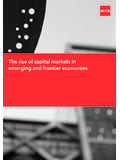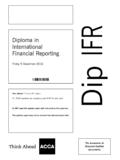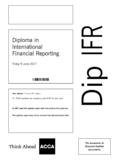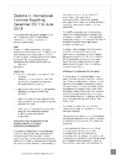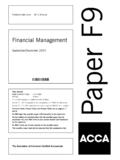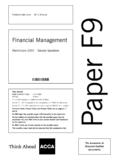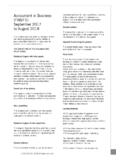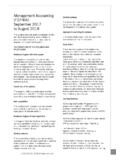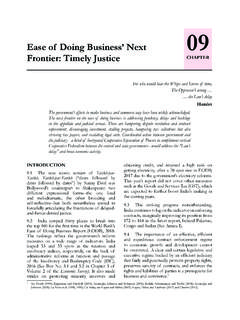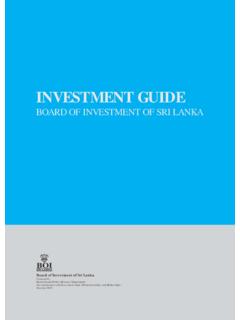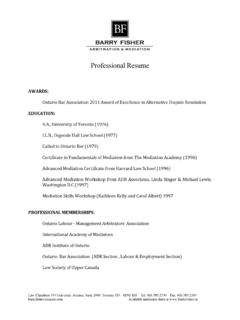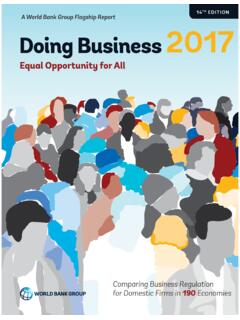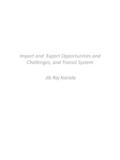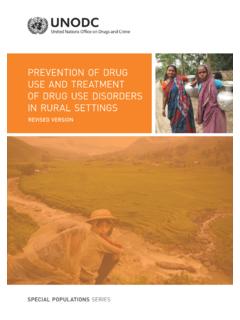Transcription of sustainability reporting matters - ACCA Global
1 sustainability reporting mattersWhat are national governments doing about it?40 The Association of Chartered Certified Accountants, 2010about aCCaACCA (the Association of Chartered Certified Accountants) is the Global body for professional accountants. We aim to offer business-relevant, first-choice qualifications to people of application, ability and ambition around the world who seek a rewarding career in accountancy, finance and management. Founded in 1904, ACCA has consistently held unique core values: opportunity, diversity, innovation, integrity and accountability. We believe that accountants bring value to economies at all stages of their development. We seek to develop capacity in the profession and encourage the adoption of Global standards. Our values are aligned to the needs of employers in all sectors and we ensure that, through our qualifications, we prepare accountants for business. We seek to open up the profession to people of all backgrounds and remove artificial barriers, innovating our qualifications and their delivery to meet the diverse needs of trainee professionals and their employers.
2 We support our 140,000 members and 404,000 students in 170 countries, helping them to develop successful careers in accounting and business, based on the skills required by employers. We work through a network of 83 offices and centres and more than 8,000 Approved Employers worldwide, who provide high standards of employee learning and development. Through our public interest remit, we promote appropriate regulation of accounting and conduct relevant research to ensure accountancy continues to grow in reputation and recognises that the concept of sustainable development is critical to society and business today. The accountancy profession has an important role in defining and delivering the means by which sustainable development is measured and has been actively involved in the unfolding debate on corporate social responsibility since 1990. We promote transparency and best practice, and aim to help businesses and organisations realise the growing importance of sustainability to them.
3 ACCA champions the extension of corporate reporting to include the social and environmental aspects of a business. We launched sustainability reporting awards with partners in Australia, Canada, New Zealand, Hong Kong, Ireland, Malaysia, Pakistan, Singapore, South Africa, Sri Lanka, the UK, and the 2002, ACCA became the first professional body to be awarded the prestigious Queen s Award for Sustainable Development. We are also members of the advisory group of the Climate Disclosure Standards Board. ACCA was represented on the Global reporting Initiative s board from inception until 2007, and our representative now chairs the GRI s technical advisory committee. ACCA is also a member of the executive board of the Accounting for sustainability project launched by HRH the Prince of reporting matters : what are national governments doing about it?by Hannah JonesThe Association of Chartered Certified Accountants (London), 20102 sustainability reporting matters What are national governmentS doing about it?
4 3 Contentsexecutive summary 51. existing guidance on sustainability reporting 92. defining sustainability 113. understanding public sector reporting 144. international understanding 185. role of the accountant 286. Conclusion 31 Further reading 32references 334 The accountancy profession has an important role in defining and delivering the means by which sustainable development is measured and SUMMARYSuStainability reporting matters What are national governmentS doing about it?5 Definition of sustainabilityWhile most definitions include a nod to social and economic elements, in many cases accounting practices have focused largely on environmental issues. Most national and international definitions of sustainability begin from the 1987 UN definition, in what is commonly known as the Brundtland development is development that meets the needs of the present without compromising the ability of future generations to meet their own needs. (Brundtland 1987) This definition emphasises that sustainability reporting should recognise the interdependence of economic, social and environmental factors; and the importance of intergenerational timescales.
5 It also has a moral element to it the need to focus on the impact on the poor. Arguably, when this definition is applied in practice it is so broad and vague that business and less enlightened governments can claim to care about the environment, but actually give priority to social and economic considerations. There is widespread interest in a Global standard for sustainability (and well-being) reporting , but a key barrier to developing this is whether it is possible to reach a universal and meaningful consensus on what sustainability or well-being may mean. The sustainability challenges of today are unprecedented. Taxpayers and citizens want to know public sector organisations are addressing them. This paper reviews how sustainability reporting is understood and managed in the public sector with an emphasis on national government reporting . ACCA believes that sustainability reporting gives national governments an opportunity to show how in their thinking and actions they are dealing with the social, economic and environmental challenges ahead.
6 sustainability reporting and corporate social responsibility (CSR) activity has grown rapidly in the private sector. While the CSR industry is increasingly showing interest in expanding into public sector reporting , ACCA believes that the differences between the sectors should be recognised as they vary in purpose, motivation and responsibility. For example, the key purpose of the public sector is to focus on the public good/interest, which is very different from the profit motive of private companies. This might affect the approach taken to sustainability reporting and the adaptation of private sector guidelines and paper makes a number of recommendations for national governments and organisations that are responsible for developing guidelines and frameworks for sustainability reporting in the future. Also, it outlines: definitions of sustainability what is specific about the public sector in relation to sustainability the different approaches adopted by governments to sustainability reporting , drawing upon five specific case studies; Canada, Mexico, Philippines, Sweden and the United Kingdomthe role of the accountant, and the challenges and opportunities that sustainability reporting presentsthe merits of some of the frameworks and guidelines which underpin sustainability summary6 What is speCifiC about sustainability in the publiC seCtor?
7 The motivation for sustainability reporting in the public sector differs from that of the private sector. In the private sector reporting is generally driven by legal requirements and industry standards. In the public sector, however, reporting by national governments is often driven by domestic political pressure, international agreements, trading relationships, targets and the need to cut costs. In the private sector, sustainability reporting frameworks rely on complex considerations of supply chains and whole-life cost models and focus on the direct impact on the environment, society or the wider economy. In contrast, the public sector s conceptualisation of sustainability is somewhat different, as it considers sustainability in a holistic way, capturing existing reporting on actions, identifying the gaps and how it can contribute to the organisation s central purpose. It also recognises that different forms of public sector organisations exist, for example central government, regional government, local government and health; and all have different responsibilities.
8 Different approaChes to sustainability reportingThe extent and focus of sustainability reporting varies between national governments. A range of initiatives do exist, mainly focused through national sustainable development strategies. Many countries provide data on indicators and targets against these strategies, and some countries also integrate environmental data into their national accounts. There is a range of reporting frameworks whereby national governments publish their progress on sustainability , most notably in relation to the United Nations (UN) and European Union (EU). Adoption of these frameworks largely depends upon the willingness and ability of national governments to report in this way. The five case studies outlined in this report (Canada, Mexico, Philippines, Sweden and the United Kingdom) show the following common of the five countries had developed an understanding of sustainability based on the Brundtland definition, but this has had a different emphasis in different countries and changed over time.
9 In Sweden, for example, a very broad approach to sustainability measures has recently become more focused on environmental countries varied in whether they integrated sustainable development into a single, mainstream government strategy, or whether they produced a stand-alone sustainable development strategy. National sustainable development strategies were enforced and promoted in different ways, whether it was through requiring lower tiers of government to develop strategies and actions flowing from the national level, reporting on indicators and measurement throughout the public sector, or through legislation to require sustainability reporting from state-owned countries (Mexico and Sweden) emphasised the international dimensions, interdependencies and effects of sustainable development as well as developing national frameworks. EXECUTIVE SUMMARYSuStainability reporting matters What are national governmentS doing about it?7guiDanCe for the publiC seCtorThere is a plethora of guidance and frameworks for reporting in the private sector, but few make reference to public sector sustainability reporting .
10 In 2005 the Global reporting Initiative (GRI) launched a Public Agencies Sector Supplement to its reporting framework, and the Centre for Public Agency sustainability reporting (CPASR) in partnership with Australian government organisations, promoted sustainability practices in public agencies through reporting . GRI has recently researched how its sector supplement has been implemented by public bodies and found that GRI reporting in the public sector was still in its infancy. Some public bodies have made progress such as local government. Different parts of the world will have different priorities within sustainability practice and reporting . This tends to be due to local circumstances of the physical environment, or social structural factors such as inequalities between specific groups. For example, congestion may be an issue for (economic, social and environmental) sustainability in London but less so in Canberra. There will also be differences in emphasis between types of public sector organisation for example, a local government may produce a report on the state of the area, while this may not be so relevant for a school.
